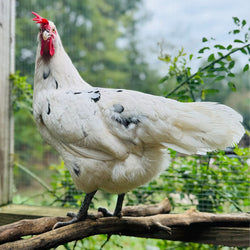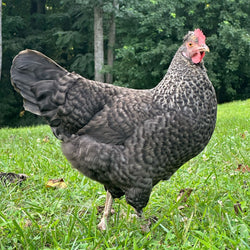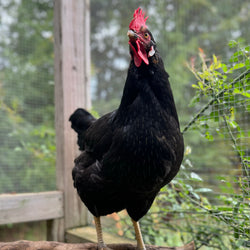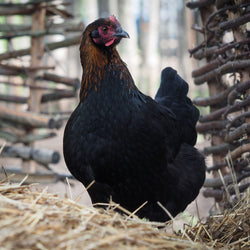www.mypetchicken.com/blogs/faqs/tagged/baby-chick-care/--
Frequently Asked Questions
Here we answer the most commonly-asked questions about ordering, chicken care, and more.
What is this black spot or thin string attached to my baby chick's rear end?
It's your chick's umbilical cord, and if you notice, that black, scabby spot or string will be below your check's vent or "pooper." Be SURE not to confuse this with pasting, which occurs on the vent, not below it. Usually the umbilical cord falls off immediately during hatching, but sometimes it can hang around for a few days (or it falls off but the belly button takes a while to heal, leaving a scabby spot). This can happen whether you hatch at home, or if you order from My Pet Chicken or another hatchery. Please don't try to remove it,...
Read MoreHow do I transition my juvenile chicks to their outdoor coop when it's cold outside?
There is no perfect age to transition your chicks to their outdoor coop, but generally by the time they are 4 to 6 weeks old, they're getting large for an indoor brooder and will want more space. Plus, they will be mostly feathered and able to maintain their body temperatures on their own. But just because you've adjusted the heat gradually down to the ambient temperature of your home doesn't mean they can go from 68 F inside to 15 F outside in the dead of winter! Sudden temperature changes are a real danger to your birds. You'll need to...
Read MoreShould I give my chicks medicated feed or unmedicated feed?
Medicated feed is formulated for chicks to help them combat coccidiosis, a disease that is found just about everywhere in the environment. Most medicated starter feeds contain the medication amprollium. Amprollium does not *treat* coccidiosis, but it helps the babies fight off cocci oocysts while they develop their own immunity. It is a preventative. If your birds have been vaccinated against coccidiosis, feeding them medicated feed will nullify the coccidiosis vaccination, although it will not hurt them. (We do not offer the coccidiosis vaccine, as it is too stressful on the birds--we offer the Marek's vaccine, which is not affected...
Read MoreFAQs on giving shipped chicks vitamins and electrolytes when they arrive
Q: Do shipped chicks need vitamins or electrolytes in their water? A: Generally, chicks do not need additional vitamins or electrolytes in their water. Fresh plain water is usually sufficient for their hydration needs. Q: Why might vitamins & electrolytes be necessary for chicks? A: Chicks may benefit from electrolytes, especially if they have undergone a stressful shipping trip. Electrolytes can aid in their recovery, providing quick energy to encourage eating and drinking. Q: How long should vitamins & electrolytes be provided to chicks? A: Electrolytes are not recommended for long-term use. Instead, they can be helpful in the first...
Read MoreHow can I stop my baby chicks from pecking each other in the brooder?
In most cases, you needn't worry. When you first receive them, your little chicks are hungry, and their instincts can tell them to peck at anything to see if it is good to eat: food, funny looking pine shavings, spots on the brooder walls, toes, eyes, freckles on your arm, and anything else. Once they learn what food is, they will not likely peck at anyone else unless they get stressed (too crowded, too hot, etc.), or they are establishing the pecking order. Right now you can sort-of think of them as little toddlers, "testing" everything by trying to put...
Read MoreCan I use a fan to cool the brooder down? My chicks are arriving in the heat of summer, and my brooder is in a hot room.
Baby chicks need it very warm to be comfortable--most people would call it hot. For the first week of their lives, they need temperatures of about 95 degrees Fahrenheit (and the temperature should be reduced by five degrees each week thereafter until they are acclimated to the surrounding environment). That said, they can indeed overheat if the temperature gets much above that. If you see your baby chicks panting or gasping with their beaks open like the little chick in the photo below, it is too hot in your brooder. Reduce the heat immediately, and give them a place to...
Read MoreAt what age can my chickens begin eating treats?
We don't really recommend feeding your new baby chicks treats right away, because they should first learn what their feed is so they will be able to get a balanced diet. Treats do not provide a balanced, nutritious diet, and it's important to give your chicks a good start in life. Keep in mind that if the baby chicks are raised by mother hen, she will get them to eat anything good that she eats, right from the beginning. There is never an age that they are too young for free ranging or eating some specific food. They are hardy...
Read MoreHow do we make sure that our older laying hens don't eat our younger chickens' starter feed, and vice versa, since the two age groups are meant to have different feeds?
Good question! Typically, you don't want your chicks to eat layer feed since it has too much calcium for them, and you don't want your laying hens to eat too much chick starter because it lacks the calcium they need to produce strong egg shells. However, if your birds are kept in the same area, it's virtually impossible to guarantee your birds will eat the right feed (and with typical perversity, they are usually drawn to the feed you don't want them to eat!) If you have birds of different ages that may have different dietary needs, there is a...
Read More







"The Clubhouse" Coop
Easy to assemble and built to last, the Clubhouse Coop is the perfect starter coop for a small flock.











